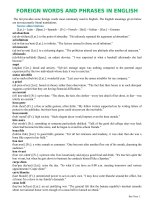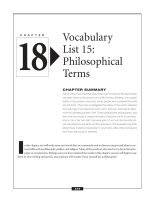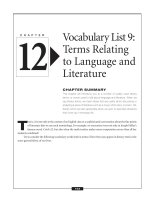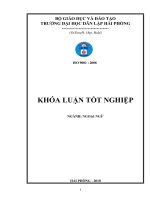Vocabulary List 5 - Foreign Language Terms Used in English
Bạn đang xem bản rút gọn của tài liệu. Xem và tải ngay bản đầy đủ của tài liệu tại đây (119.13 KB, 14 trang )
C H A P T E R
8
Vocabulary List 5:
Foreign Language
Terms Used in
English
CHAPTER SUMMARY
In this chapter, you will learn words from other languages, such as
French and Italian, that are used in everyday English. Many of these
words have been adopted into the English language because there is
not an English word that means exactly the same thing. For example,
the word naïve is used frequently to describe someone who is young,
innocent, simple, and sometimes gullible. In English, we would have to
use three or four words to express the same thing that the word naïve
does. Some of these words are used frequently in articles about the
arts. Others are used in writing about history or politics. All of these
words are used frequently in everyday speech and writing so it is
important to be familiar with them.
n this chapter, you will practice using these “foreign” words and learn the meaning and spelling of each one
by completing the exercises. You may recognize many of these words when you hear them, but they may appear
foreign to you when you see them written. This is because the pronunciation of each word follows the rules
of the original language it is from and not necessarily traditional English pronunciation. Practice saying each word
out loud as you read through the list.
I
87
– VOCABULARY LIST 5: FOREIGN LANGUAGE TERMS USED IN ENGLISH –
Choose the word from the Vocabulary List that best fits into the crossword puzzle. You can check your answers
at the end of the chapter following the answers to the questions.
Vocabulary List 5: Foreign Language Terms Used in English
aficionado
avant-garde
blasé
bourgeois
cliché
debut
élan
entrepeneur
epitome
fait-accompli
gauche
imbroglio
ingénue
laissez-faire
malaise
naïve
non sequitur
rendezvous
vendetta
vignette
1
2
3
4
5
6
7
8
10
9
11
13
12
14
15
16
17
18
19
20
Across
4 a complicated or embarrassing
situation
7 animation, spirit, life
9 a naïve young woman
11 unsophisticated and gullible
12 a short, descriptive piece of
writing
14 grudge, feud
17 something finished and
irreversible
18 quintessence
19 vague feeling of illness
20 first appearance
89
Down
1 an overly familiar, overused
phrase
2 middle class
3 apathetic, uninterested
5 bumbling, crude
6 cutting edge
8 hands-off
10 a statement that has no
connection to the previous
statement or idea
13 someone who takes on a new
business challenge or risk
15 a buff or devotee
16 to meet at an appointed place
and time
– VOCABULARY LIST 5: FOREIGN LANGUAGE TERMS USED IN ENGLISH –
cliché
(kle · sha)
¯
¯
(noun)
a phrase or saying which has been overused and, as a
result, has little significance or meaning
Try to avoid using
in your writing, as
they are not as powerful as vivid, fresh
language.
aficionado (ə·fi·she· na·do
¯
¯)
(noun)
a person who likes, knows about, and is devoted to a
particular activity or thing
Jonelle has been a baseball
ever since she
went to her first game with her dad.
avant-garde ( a·va nt· a rd)
(noun)
a group of people who develop innovative and
experimental concepts, especially in the arts
(adj.)
relating to a group of people who develop innovative
and experimental concepts, especially in the
arts
As part of the
, Abe’s paintings have
always been on the cutting edge.
Ted’s art has become increasingly
; he
now is building sculptures in his loft in
Brooklyn.
debut ( da ·byu)
¯
(noun)
a first appearance
The tennis player was nervous about her
as a professional.
élan
(a ·la n)
¯
(noun)
spirit, enthusiasm, or excitement
The medical resident showed great
for
medicine; she was always prepared and asked a
lot of questions.
blasé
(bla· za)
¯
(adj.)
apathetic to pleasure or excitement as a result of
excessive indulgence in something
Because Jon works in the music industry, going to
concerts has become
, as they are no
longer a novelty.
entrepreneur
(ann·trə·prə· nər)
(noun)
a person who takes on the challenge and risk of
starting his or her own business
Being a(n)
is nerve-wracking because
you can never be certain that your idea will be a
hit.
bourgeois
( bu
˙rzh·wa)
(adj.)
having the attributes and beliefs of the middle class,
marked by materialistic concerns
Pete has never succumbed to
values—he
is comfortable living a simple life.
epitome
(i· pi·tə·me)
¯
(noun)
an exact example of something; someone or
something that embodies the essence of a
concept or type
He is the
of a scientist with his wirerimmed glasses and absent-minded attitude.
91
– VOCABULARY LIST 5: FOREIGN LANGUAGE TERMS USED IN ENGLISH –
fait-accompli
( fa·tə·ka m· ple)
¯
¯
(noun)
something that is complete and seemingly
irreversible
When she signed the one-year lease for her new
apartment, it was a
.
naïve (na · ev)
¯
(adj.)
innocent, simple, lacking knowledge of the world
I told him he was
to think that his
landlord would offer to fix his sink without a
written or verbal request.
gauche
( o
¯sh)
(adj.)
lacking social graces or sophistication
The teenager felt
in the company of a
more sophisticated crowd.
non sequitur
( nan· se·kwə·tər)
(noun)
a statement that has no connection to the previous
statement or idea
My grandmother made such a
yesterday.
She was telling me about her wedding and then
in the next breath said her car needed to be
fixed.
imbroglio
(im· bro l·yo
¯ ¯)
(noun)
a complicated or embarrassing situation due to a
misunderstanding
When David thought that Sally was my girlfriend
instead of my sister, it created an
until I cleared up the misunderstanding.
rendezvous
( ran·da ·vu)
¯
(noun)
a meeting place
(verb)
to meet at a meeting place
They decided the school would be their
and then they would go to the park.
ingénue
( an·jə·nu)
(noun)
a young girl or woman, an actress playing such a role
She was an
; she was young and innocent.
,
vendetta
(ven· de·tə)
(noun)
a grudge or feud characterized by acts of retaliation
He had a
against the man who killed his
father and vowed he would seek revenge.
laissez-faire (le·sa· far)
¯
(noun)
a doctrine opposing government control of
economic matters except in the case of
maintaining peace and the concept of property
He believed in a
policy because he
thought that the government should not
interfere with economic matters.
vignette (vin· yet)
(noun)
a short descriptive written piece
The teacher asked the class to write a
about their home so they could practice writing
short but clear descriptive pieces.
malaise
(mə· la z)
¯
(noun)
the vague feeling of illness
She went to the doctor because she felt a general
and thought she was coming down
with something.
92
– VOCABULARY LIST 5: FOREIGN LANGUAGE TERMS USED IN ENGLISH –
Words in Context
Sentence Completion
The following exercise will help you figure out the
meaning of some words from Vocabulary List 5 by
reading context clues. After you have read and understood the paragraph, explain the context clues that
helped you with the meaning of the vocabulary word.
Refer to the answer section at the end of this chapter for
an explanation of the clues.
Insert the correct word from Vocabulary List 5 into
the following sentences.
1. After taking care of my brother, who had been
sick with the flu, I started getting a feeling of
and assumed I was getting sick, too.
At the party, I watched as a young man
introduced himself as an entrepreneur to a
naïve young woman, and then continued
to brag about the business he recently
opened. The young woman was so innocent that she didn’t even realize that the
man was flirting with her. For her sake, I
joined the conversation rather abruptly by
making a political comment about our
government’s laissez-faire policy regarding
economic regulation. I explained that it
was ridiculous that our government did
not see itself as responsible for regulating
economic relations in our country because
many low-income people suffered as a
result. The young entrepreneur seemed
confused at first by my apparent non
sequitur because it had absolutely nothing
to do with his previous statement regarding his business. Yet he did not want to
appear gauche in front of the young
woman so he smiled and politely asked me
to explain my view on laissez-faire policies.
At that point, the young woman excused
herself and said that she was feeling a slight
malaise and thought she should go home
to rest. The young entrepreneur quickly
suggested that they rendezvous at the park
the following day, but the young woman
politely declined.
2. In my favorite movie, the main character, Ray,
has a
against the mob
boss who bankrupted his father.
3. The college graduate was too
to realize that his boss
wouldn’t give him a vacation unless he asked
for it.
4. The prospective college freshman was so nervous
during her interview that she answered her first
question with a
; it was
irrelevant to what the admissions officer had
asked.
5. We arranged that if we got lost, we would
in the lobby of the
hotel.
6. On the first day of class, he wrote a
about his house to
practice his descriptive writing.
7. The young actress hated playing a(n)
, but she always got
those parts because she was young and attractive.
8. She went to dinner with some friends at a very
fancy restaurant and felt
because she didn’t know which fork to use for her
salad.
93
– VOCABULARY LIST 5: FOREIGN LANGUAGE TERMS USED IN ENGLISH –
9. My dad always speaks in
17. The plot of many TV sitcoms seems to revolve
around a(n)
; there is
some big misunderstanding, which results in an
embarrassing situation, but it is usually resolved
by the end of the show.
when he gives me
advice. For example, the other day, he told me
not to count my chickens before they hatch.
10. My mother is a car
; she
knows everything there is to know about cars and
loves to test drive different models.
18. When she graduated from high school, it was a
; she had completed all
of the requirements.
11. Her art teacher said her sculpture was
because she used both
metal and plastic in a way he had never seen done
before.
19. At the ballet, the young dancer made her
in the second act.
20. Most advertisements seem to include
values because middle
class people are able to buy the items being
advertised.
12. When Kathy asked Sylvia if she wanted to go to
the World Series with her, she was surprised that
Sylvia was
about it, but
Sylvia explained that she had been to the World
Series five years in a row, and it was starting to
get boring.
Synonyms
The following exercise lists vocabulary words from this
chapter. Each word is followed by five answer choices.
Four of them are synonyms of the vocabulary word is
bold. Your task is to choose the one that is NOT a
synonym.
13. The young musician showed such
when he played the
guitar; he played very difficult pieces without
missing a note and seemed to enjoy himself
immensely.
21. blasé
a. bored
b. enthusiastic
c. apathetic
d. neutral
14. The
was very proud
when he opened the doors of his new pet supply
store on the first day of business.
22. avant-garde
a. creative
b. cutting edge
c. conventional
d. innovative
15. She had just graduated from law school, but she
already looked like the
of a lawyer with her expression, briefcase and nononsense professional suit.
16. The politician argued against the
policy because she felt
that if economic matters were not regulated in
the country, large companies would take advantage of consumers.
23. naïve
a. innocent
b. simple
c. knowledgeable
d. trusting
94
– VOCABULARY LIST 5: FOREIGN LANGUAGE TERMS USED IN ENGLISH –
24. élan
a. disinterest
b. excitement
c. spirit
d. enthusiasm
27. vendetta
a. grudge
b. feud
c. fight
d. truce
25. aficionado
a. fan
b. novice
c. devotee
d. expert
28. vignette
a. novel
b. short piece
c. description
d. literary piece
26. non sequitur
a. unrelated
b. disconnected
c. clear line of thought
d. disjointed
29. cliché
a. truism
b. commonplace
c. original statement
d. familiar
30. malaise
a. sickness
b. illness
c. healthy
d. unwell
Antonyms
Choose the word from Vocabulary List 5 that means the opposite, or most nearly the opposite, of the following
groups of words.
31. sophisticated, graceful, classy, worldly
32. wise, mature, complicated, sophisticated
33. poor, not materialistic, working class
34. incomplete, reversible, disputable
35. old, wise, masculine
36. boredom, disinterest, despondent
37. clear, comfortable, easily understand situation
95
– VOCABULARY LIST 5: FOREIGN LANGUAGE TERMS USED IN ENGLISH –
38. excitement, enthusiasm, wide-eyed, naïve
39. friendship, peaceful relationship, reconciliation
40. retirement, seclusion, final appearance
Matching Questions
55. ingénue
o. having middle-class values
Match the word in the first column with the corresponding word in the second column.
56. laissez-faire
p. first appearance
41. debut
a.
57. imbroglio
q. one who starts his/her
own business
42. aficionado
b. lacking social graces
58. bourgeois
r.
an example or the
embodiment of something
59. non sequitur
s.
a political doctrine, which
supports government
deregulation of economic
matters
60. blasé
t.
innocent, simple
a young girl
43. avant-garde
c.
44. élan
d. apathetic
45. gauche
e.
spirit
46. naïve
f.
a complicated
misunderstanding
47. vendetta
g.
a meeting place
a statement that does not
relate to the previous
statement
48. vignette
i.
a feeling of sickness
50. malaise
j.
an overused statement
51. entrepreneur
k. a short descriptive piece
52. epitome
l.
53. fait-accompli
m. a fan or devotee
54. rendezvous
Many or the words from this chapter are used in articles about art, politics, and history. Read a newspaper
or magazine article about art or architecture, and an
article about contemporary or historical politics, and
write down all of the foreign words you come across.
How do you know if a word is a foreign word? How is
it being used in the article? Add these words to your
vocabulary list and look up the definition.
Now that you know these words, make a note
when and where you see them. Think about the following questions: When do people use these words?
What effect does it have on the piece of writing you are
reading? Why have these particular words become such
a regular part of our vocabulary?
h. a completed fact
49. cliché
Practice Activities
n. artistically innovative
a feud characterized by
acts of retaliation
96
– VOCABULARY LIST 5: FOREIGN LANGUAGE TERMS USED IN ENGLISH –
Answers
6. vignette. If you got this question wrong, refer back
Words in Context
In the first sentence, we learn that the young man is an
entrepreneur and that he is talking about a business he
started, so we can conclude that being an entrepreneur
has something to do with starting one’s own business.
The young woman is described as naïve and then in the
next sentence described as very innocent. The narrator
also explains that she enters this conversation “for her
sake” so we can conclude that naïve means young and
innocent and possibly in need of help. The next word
we encounter is laissez-faire, which is used to describe
our government’s economic policy, so we know that it
refers to something political and relates to economics.
In the next sentence, it becomes clearer that the narrator is using the word to mean that our government is
not regulating economic matters. Non sequitur is used
to refer to the narrator’s comment and the fact that it
is completely unrelated to the entrepreneur’s previous
statement, so we can deduce that non sequitur means an
unrelated statement. The entrepreneur does not want
to appear gauche, so he is polite even though he is confused by the comment. We can conclude that gauche
must mean impolite or lacking social graces. We can
deduce that malaise must mean feeling ill or tired
because the young woman needs to go home and rest.
Finally, the entrepreneur asks the young woman to
“rendezvous at the park the next day,” so we can conclude that rendezvous must mean meet.
7.
8.
9.
10.
11.
12.
13.
14.
15.
16.
17.
18.
19.
20.
Sentence Completion
1. malaise. If you got this question wrong, refer back
2.
3.
4.
5.
to the word’s definition.
vendetta. If you got this question wrong, refer back
to the word’s definition.
naïve. If you got this question wrong, refer back to
the word’s definition.
non sequitur. If you got this question wrong, refer
back to the word’s definition.
rendezvous. If you got this question wrong, refer
back to the word’s definition.
to the word’s definition.
ingénue. If you got this question wrong, refer back
to the word’s definition.
gauche. If you got this question wrong, refer back
to the word’s definition.
clichés. If you got this question wrong, refer back
to the word’s definition.
aficionado. If you got this question wrong, refer
back to the word’s definition.
avant-garde. If you got this question wrong, refer
back to the word’s definition.
blasé. If you got this question wrong, refer back to
the word’s definition.
élan. If you got this question wrong, refer back to
the word’s definition.
entrepreneur. If you got this question wrong, refer
back to the word’s definition.
epitome. If you got this question wrong, refer back
to the word’s definition.
laissez-faire. If you got this question wrong, refer
back to the word’s definition.
imbroglio. If you got this question wrong, refer
back to the word’s definition.
fait-accompli. If you got this question wrong,
refer back to the word’s definition.
debut. If you got this question wrong, refer back to
the word’s definition.
bourgeois. If you got this question wrong, refer
back to the word’s definition.
Synonyms
21. b. enthusiastic. Blasé means apathetic about
something due to over indulgence. Enthusiastic would not be a synonym because it
means to be excited about something.
22. c. conventional. Avant-garde means original
and creative, so conventional is not a synonym because it means lacking originality.
97
– VOCABULARY LIST 5: FOREIGN LANGUAGE TERMS USED IN ENGLISH –
23. c. knowledgeable. Naïve means simple and
24.
25.
26.
27.
28.
29.
30.
34. fait-accompli. Fait accompli means a completed
innocent, so knowledgeable is not a synonym
because it means having knowledge.
a. disinterest. Élan means spirit or enthusiasm
so disinterest is not a synonym because it
means lacking interest.
b. novice. An aficionado is an expert or devotee
to something. A novice is someone who is
new to something, so it is not a synonym.
c. clear line of thought. A non sequitur is a statement that is not connected to the previous
statement. A clear line of thought refers to
several statements that follow each other, so
it is not a synonym.
d. truce. A vendetta is grudge or feud characterized by acts of retaliation. A truce is not a
synonym because it means to settle or end a
fight or disagreement.
a. novel. A vignette is a short descriptive piece,
but a novel is a long written story, so it is not
a synonym.
c. original statement. A cliché is a statement or
saying that has been so overused that it lacks
meaning. An original statement is not a synonym because it means a statement that is
new and has not been used before.
c. healthy. Malaise means a feeling of sickness,
but healthy means to feel well, so it is not a
synonym.
35.
36.
37.
38.
39.
40.
fact that is irreversible, the opposite of the words
in the group.
ingénue. An ingénue is a young naïve girl, the
opposite of the words in the group.
élan. Élan means spirit, enthusiasm, the opposite
of the words in the list.
imbroglio. An imbroglio is a complicated situation or an embarrassing misunderstanding, the
opposite of the words listed.
blasé. Blasé means apathetic due to over indulgence in something, the opposite of the words
listed.
vendetta. Vendetta means a feud or grudge characterized by retaliation.
debut. Debut means first appearance, usually relating to one’s entrance into society, the opposite of
the words in the list.
Matching Questions
41. p
42. m
43. n
44. e
45. b
46. t
47. l
48. k
49. j
50. i
51. q
Antonyms
31. gauche. Gauche means lacking social grace or
52. r
sophistication, the opposite of the meaning of the
words in the group.
32. naïve. Naïve means simple and innocent, the
opposite of the meaning of the words in the group.
33. bourgeois. Bourgeois means characteristics of
the middle class and materialistic, the opposite of
the words in the group.
53. h
54. c
55. a
56. s
57. f
58. o
59. g
60. d
98
– VOCABULARY LIST 5: FOREIGN LANGUAGE TERMS USED IN ENGLISH –
Across
4 imbroglio
7 élan
9 ingénue
11 naïve
12 vignette
14 vendetta
17 fait-accompli
18 epitome
19 malaise
20 debut
Down
1 cliché
2 bourgeois
3 blasé
5 gauche
6 avant-garde
8 laissez-faire
10 nonsequitur
13 entrepreneur
15 aficionado
16 rendezvous
C
B
L
I M B R O G L I O
I
A
C
G
S
H
A
A
É L A N
I N G É
U
N A Ï V E
A
C
A
V I G N E T T E
H
N
S
N
V E N D E T T A
S
A
T
E
F
R
R
G
Z
I
E
E
F A I T - A C C O M P L
N
R
F
I
R
D
D
A
O
E
E P I T O M E
I
N
N
Z
R
A
E
V
M A L A I S E
D E B U T
O
O
R
U
S
99
B
O
U
R
G
N U E
O
O
N
I
S
S
E
Q
U
I
T
U
R









